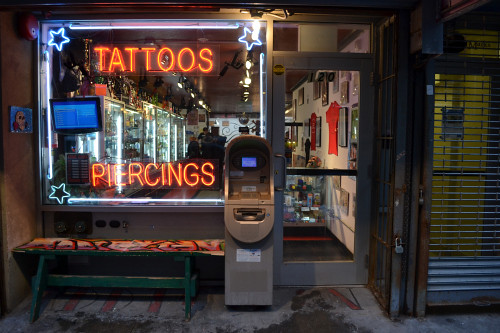Covered in graffiti and often looking distinctly unloved, sidewalk ATMs are a common sight in the East Village. In fact, the neighborhood has more of the machines than anywhere else in Manhattan. Ready access to cash fuels the neighborhood’s bar scene and the machines generate a steady stream of easy revenue for the property owners who host them.
But in December, the City Council made clear its view that the machines are a blight and voted to ban them from city streets. After some dithering, Mayor Michael Bloomberg signed the bill on Jan. 4. The law will come into effect in May.
The decision has elicited mixed responses.
Jessica Dickstein, 29, a brand manager at a toy company, said she has no particular allegience to sidewalk ATMs but will use one if she feels it is the most convenient option. Sometimes, she added, she prefers the sidewalk machines because they often have lower fees than those in banks. Asked if she thinks using a sidewalk machine is less safe than using one in a bodega or bank lobby, Ms. Dickstein said, “If you’re going to be getting cash at 3 a.m. that’s not a great idea.”
Among the most vehement critics of the new rule are the business owners who stand to lose a source of easy revenue. Informed of the impending ban, Alex Zhik, manager of Addition Ink, a tattoo parlor, initially responded in terms too colorful to repeat. In a more measured tone, he added that the move will inconvenience shoppers and hurt small businesses.
Reluctant to give a precise figure, Mr. Zhik said the machine outside his store brings in around $1,000 a month. The business owner who hosts the machine typically keeps half of the fee levied on withdrawals, with the other half going to the operating company. “It’s money at the end of the day,” Mr. Zhik said.
The Local counted 14 other sidewalk ATMs on St. Marks Place alone and spotted many more on Avenue A. A 2009 survey by the Manhattan Borough President’s Office counted 99 of the outdoor machines in the East Village, out of total 242 in Manhattan.
The City will fine property owners $5,000 for each week they do not remove the machines, starting 30 days after notice is served. Once the fines accumulate to $50,000, the Department of Transportation has been empowered to haul the offending machines away. Previously, the department could only issue much smaller fines on grounds the machines broke street furniture rules.
Passing the law is only the first step. Actually removing the machines will be a longer process. Although property owners earn revenue from the machines, they are operated by independent companies. Susan Stetzer, district manager of Community Board 3, said she has already received a call from one storeowner who cannot get his machine removed.
Discovering who has responsibility for the machines is tricky. Mr. Zhik’s ATM is operated by ATM of America, which is based in Michigan. But Sabah Ammouri, president and CEO of that company, said day-to-day responsibility for the machines lies with independent “footsoldiers”. Often one-man operations, these subcontractors stock the machines with cash – often hauling around tens of thousands of dollars in their cars – and keep them in working order.
“The City needs to provide recourse for business owners who can’t get the ATM companies to remove the machines,” Ms. Stetzer said.
Ali Hamoudeh, chief operating officer of Brooklyn-based The Big Apple ATM, said he operates between 20 and 30 machines in the East Village. Not willing to concede defeat, he is working with his clients to cut openings in their storefronts for the machines to poke through. That way, they will still be accessible from the sidewalk but will actually be located inside the store. Mr. Hamoudeh said that thinning the ranks of machines could be beneficial to operators.
“It’s out of control. It gets to the point when there’s a machine outside every store. They’re so common that people have lost respect for them,” he said. He explained that as the number of ATMs has increased so have thefts targeting them. At times entire machines have been carted off. Thieves have also been known to drill open sidewalk ATMs and abscond with the cash inside.
Mr. Hamoudeh recognized the need to impose order, but said his industry was not consulted about the new law.




